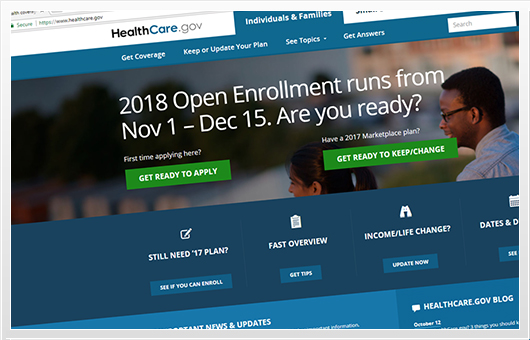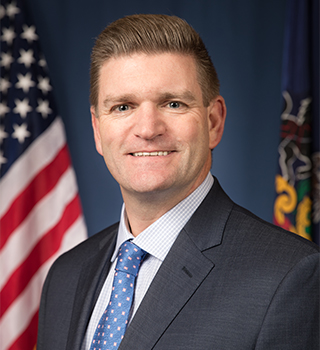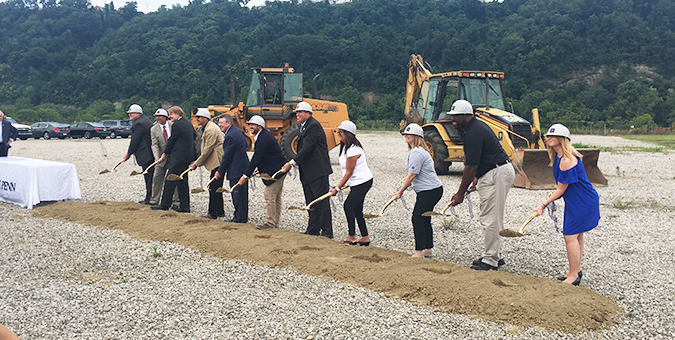December 9, 2017
McKeesport – December 9, 2017 – State Sen. Jim Brewster (D-Allegheny/Westmoreland) issued the following statement concerning the death of former state Senate Democratic Leader Edward Zemprelli, who passed away on Monday, Dec. 4.
Zemprelli of Clairton was elected to the Senate in 1968 and was majority leader from 1979-80. He served the citizens of the Mon Valley’s 45th Senate District from 1968 to 1988. Previously, he served in the state House of Representatives from 1963 to 1968.
During his years in the Senate, Zemprelli worked to reform the state’s banking laws, aid distressed municipalities, shore up funding for state highways and rescue the Unemployment
Compensation Fund that was drained of funds due to economic dislocation.
He was a strong advocate of issues important to working men and women and an early supporter of the Mon-Fayette Expressway.
Brewster’s comments follow:
“Senator Zemprelli served the citizens of the Mon Valley well for decades. He was a tireless defender of working men and women and was at the forefront of efforts to deal with the dislocation of the steel industry.
“He served in a time of significant change and rose to become the Senate’s majority leader, but he never forgot his roots in the Mon Valley or its people. As a lawmaker, he was heavily involved in helping communities address economic distress, developing the Mon-Fayette Expressway, reforming our state’s banking laws and ensuring that resources were available for schools.
“Senator Zemprelli was colorful and candid, and was welcomed throughout the region as an articulate and passionate public speaker. He was well-respected by his peers and put his stamp on legislation and projects that will benefit generations to come.
“On behalf of the citizens of the district he served so well, I extend my condolences to his daughter, his family and his legion of friends.
-30-
Contact: Timothy Joyce
Phone: 412 380-2242
Email: Timothy.Joyce@pasenate.com
December 8, 2017
December 7, 2017
Harrisburg – December 7, 2017 – Four grants totaling more than $275,000 to improve recreational opportunities, preserve green space and rehabilitate community facilities in Lincoln Borough, Brentwood, Duquesne and West Mifflin have been approved by the state Department of Conservation and Natural Resources (DCNR), state Sen. Jim Brewster (D-Allegheny/Westmoreland) said today.
“We have to continue to make improving recreation facilities, preserving natural resources and promoting community parks a priority,” Brewster said. “The approval of the state funds for these projects will improve access and help stretch local taxpayer dollars.”
The DCNR funds were approved through the department’s Community Conservation Partnership Program. The projects slated to receive the state grant funds include:
- Allegheny Land Trust for the continued development of the Dead Man’s Hollow trail system in Lincoln Borough ($148,600);
- Duquesne City to prepare a comprehensive recreation and open space plan ($17,800);
- West Mifflin will receive funds to develop a comprehensive recreation and open space plan ($20,000);
- Brentwood Borough to rehabilitate the Brentwood Pool ($100,000).
“Helping communities develop their recreation facilities improves the quality of life and aids in strengthening a municipality,” Brewster said. “We have tremendous natural resources and community amenities.”
The grants were among the 266 projects approved statewide. The department released $44 million in state funding.
-30-
November 29, 2017
Trib Total Media Building Donation Ignites Business, Education Interest
McKeesport – November 29, 2017 – State Sen. Jim Brewster (D-Allegheny/Westmoreland) today released the following statement extolling the repurposing of the former Daily News building in downtown McKeesport as a future media center saying that it “opens the doors to even more business and educational activities at the site.”
Brewster and McKeesport Mayor Michael Cherepko have been heavily involved in the project and the effort to reuse the former Daily News building. They have engaged in discussions about the location of a satellite office of the Mon Valley Independent, been in contact with a radio station about relocating to the site and held talks with other local businesses about the project.
Trib Total Media donated the building and will have access to space in the structure to house its staff. The project includes the proposed hosting of a Media Accelerator, which will be engaged in attracting start up multimedia companies. Other space will be used as an incubator for new educational opportunities. Preliminary discussions have been held with Point Park University.
Brewster’s statement follows:
“The donation of the building by Trib Total Media is a generous and very welcome development. The repurposing of the building as a media center and the potential engagement of Point Park University, the Mon Valley Independent and the use of the facility as a Media Accelerator is exciting. It opens the doors to even more business and educational activities at the site.
“The transfer of the property is going to benefit the entire Mon Valley, not just McKeesport. It will generate business activity in the heart of the downtown and serve as a focal point in the development of new media. New jobs will be created and start-up businesses will have the chance to grow and flourish. The innovation associated with using a former headquarters of a daily newspaper as the center of renewed interest in all media platforms is striking and will help transform the region.”
Brewster said that he was especially appreciative of the efforts of Trib Total Media President and CEO Jennifer Bertetto for her efforts in moving the project along. He said that giving the building back to the community and working to make sure the project is a success is a gift that will pay dividends for future generations.
-30-
November 28, 2017
Harrisburg – November 28, 2017 – State Sen. Jim Brewster (D-Allegheny/Westmoreland) today announced that he will hold office hours at his satellite office in Turtle Creek on the first Tuesday of each month.
Previously, the office hours were held on the first Wednesday.
“We have had great success in helping constituents through my satellite district offices,” Brewster said. “It is important to reach out into the community to provide the services that are available in my permanent offices.”
The new office hours are on the first Tuesday of each month from 1 p.m. to 4 p.m. at Human Services Corp., 413 Penn Ave. Extension in Turtle Creek.
“My staff will be available to help residents with state-related issues, complete home heating assistance applications and property tax and rent rebate forms in addition to birth certificate paperwork and other services,” Brewster said. “We hold the office hours in the community so that those who are unable to travel can still get the help they need.”
Brewster’s permanent district offices are in Monroeville, McKeesport and New Kensington.
-30-
November 17, 2017
Harrisburg – November 17, 2017 – State Sen. Jim Brewster (D-Allegheny/Westmoreland) said today he was pleased that more than $380,000 in Safe Schools grants have been awarded to several school districts in Allegheny and Westmoreland counties.
“The funding is critical in providing a safe learning environment for our children,” Brewster said. “The grants can be used for training and compensating school resource and police officers, plus pay for safety programs and equipment.”
Brewster said that the wide range of funding will augment local efforts and enhance education opportunities for all students, while bolstering safety programs that protect students, faculty, staff and visitors to area school districts.
School Districts that received School Police/Resource Officer grants which are used for training and compensation of school resource officers and school police include:
- McKeesport Area School District ($30,000);
- South Allegheny School District ($20,000);
- Baldwin-Whitehall School District ($60,000);
- Plum Borough School District ($60,000);
- Elizabeth Forward School District ($60,000);
- Allegheny Township Police Department on behalf of Kiski Area School District ($60,000);
- West Jefferson Hills School District ($40,000).
Brewster said the West Mifflin Area School District was awarded a Safe Schools Grant of $15,000 to address school safety, conflict resolution, dispute management, behavior support, risk assessment, training for risk-assessment and the development of research-based violence prevention programs.
The senator said Penn-Trafford and Gateway were awarded Safe Schools Equipment Grants. Penn-Trafford will receive $18,384 and Gateway $19,274 to assist in reducing unnecessary student disciplinary actions.
-30-
November 15, 2017
Harrisburg – November 15, 2017 – Four grants worth nearly $1 million were approved by the state’s Commonwealth Financing Authority (CFA) to fund transportation projects in Allegheny and Westmoreland counties, according to state Sen. Jim Brewster (D-Allegheny/Westmoreland).
The projects include a $600,000 grant for the Port Authority of Allegheny County to help build, rehabilitate and modernize the new McKeesport Transportation Center, located in the center of the city.
“These grants will fund key transportation initiatives that serve the public in a variety of ways,” Brewster said. “Not only is there grant funding for the new transportation center in McKeesport, but there are funds for streetscape, road resurfacing and the construction of a bike connector in other municipalities.”
Brewster said that $163,216 was approved for a streetscape project along Brownsville Road in Brentwood. Also approved were grants of $118,000 for road work in Vandergrift, Westmoreland County and $118,784 for the construction of a trail connector through Elm Leaf Park in Baldwin Borough.
The funding for the multimodal projects were approved at a meeting yesterday in Harrisburg.
“Improving our transportation network is essential to building and rebuilding our economy and improving communities throughout the region,” Brewster said. “I am pleased that these state resources will be used to fund these important projects.”
Brewster serves as a member of the state Senate Transportation Committee.
-30-
November 14, 2017
Harrisburg – November 14, 2017 – Grants totaling more than $1.3 million were approved to address transportation, recreation, flood mitigation and public safety in the Mon Valley and eastern Allegheny County, state Sen. Jim Brewster (D-Allegheny/Westmoreland) and state Rep. Joe Markosek (D-Allegheny) said.
The grant funding was approved by the Commonwealth Financing Authority (CFA) at a meeting this morning in Harrisburg. Grants were targeted for Monroeville, Pitcairn, North Versailles and East McKeesport.
“The projects approved today will address specific needs of municipalities,” Brewster said. “This funding will help build up and enhance our transportation system, curb flooding, improve recreational opportunities and promote public safety.”
“These projects improve the quality of life in the region and aid economic development and job creation efforts,” Markosek said. “State support for these local projects is essential because many communities do not have the local resources to properly fund the work.
“Plus, it is critical to draw down state grant funding to help alleviate the local tax burden.”
The projects approved today include:
- $279,433 for flood mitigation along Dirty Camp Run in Pitcairn;
- $211,241 for Crestas Park renovation in North Versailles;
- $795,690 for pedestrian and streetscape improvements in East McKeesport;
- $100,000 to help the Monroeville Police Department upgrade its mobile radio system.
Brewster said that the CFA approval of these grants provide important pieces of funding for projects in the communities and that both he and Markosek represent.
“Communities in our region have great needs that can, in many cases, only be met by applying state resources,” Brewster said. “Local tax dollars are already being stretched and Representative Markosek and I are aggressive in pursuing state dollars so projects can be completed.”
Markosek noted that he was pleased that the state is making these investments and that funding of over $1.3 million is significant.
“Both Senator Brewster and I work to ensure that projects in our municipalities are funded and that state dollars are used to pay for a lion’s share of the costs,” Markosek said.
Brewster serves as Democratic chair of the Law and Justice and Game and Fisheries committees in the state Senate. Markosek is Democratic appropriations chair in the state House of Representatives.
-30-
October 30, 2017
Harrisburg – October 30, 2017 — Sen. Jim Brewster (D-Allegheny/Westmoreland) reminded individuals and families who need health coverage through the Affordable Care Act for 2018 that the open enrollment period begins on Nov. 1 and runs through Dec. 15.
 “It is important for individuals and families to understand that they can access health care through the insurance marketplace,” Brewster said. “With the attempted repeals of the Affordable Care Act, there has been a great deal of confusion about the future of the marketplace. The marketplace will be open for enrollment in November.
“It is important for individuals and families to understand that they can access health care through the insurance marketplace,” Brewster said. “With the attempted repeals of the Affordable Care Act, there has been a great deal of confusion about the future of the marketplace. The marketplace will be open for enrollment in November.
“The fear is that those who can access health care through the marketplace will not sign up for coverage.”
Brewster said that lawmakers need to reverse the impression that access to health care coverage is not available.
Individuals can re-enroll or enroll for coverage by visiting HealthCare.gov or call the Marketplace Call Center 24 hours a day at 1-800-318-2596.
The Affordable Care Act has helped more than a million Pennsylvanians receive health care. More than 700,000 individuals gained coverage through Medicaid expansion and another 400,000 purchased coverage on the individual marketplace.
According to the Wolf Administration, the state’s rate of uninsured Pennsylvanians is at 5.6 percent, its lowest level ever.
“Taking a moment of time to explore the insurance marketplace to find the right insurance plan for your family is a good investment,” Brewster said. “Health insurance provides life-saving access to care and saves individuals and families money when they face medical issues.
-30-
October 25, 2017
Harrisburg – October 25, 2017 – State Sen. Jim Brewster (D-Allegheny/Westmoreland), in partnership with Human Services Center Corporation (HSCC) in Turtle Creek and the YWCA Greater Pittsburgh, will be hosting a health coverage and Low-Income Home Energy Assistance (LIHEAP) enrollment event on Thursday, Nov. 9 from 10:30 a.m. to 2:30 p.m. at the offices of HSCC, 519 Penn Ave., Turtle Creek.
“Given all the recent upheaval regarding the Affordable Care Act, questions have arisen about health care coverage, who is eligible and how individuals that need access to care can sign up,” Brewster said. “These are critical questions that deserve accurate answers.”
Brewster’s staff and officials from HSCC and the YWCA Greater Pittsburgh will be on hand to answer questions and enroll those who are interested in health insurance through Health Insurance Marketplace. Those who participate also will be able to enroll in Medicaid and complete applications for heating assistance through LIHEAP.
“Accessing health care through the marketplace can help families manage health care costs and receive life-saving care,” Brewster said. “The professionals on hand will be able to answer questions and help enroll citizens in Medicaid and the health marketplace and assist in completing LIHEAP applications.
“I cannot emphasize how important it is for those who want to access health care to come to the enrollment event and learn what is available.”
Brewster said appointments can be made by calling HSCC at 412-829-7112 or book online. Those planning to enroll should bring name, date of birth, Social Security number(s), recent pay stubs for all household members and a recent heating bill if there is interest in applying for LIHEAP.
-30-

October 23, 2017

Senator Jim Brewster

Senator Vincent Hughes

Senator John Yudichak
Op-ed by state Sen. John T. Yudichak (D-Luzerne), Sen. Vincent J. Hughes (D-Philadelphia), Sen. Jim Brewster (D-Allegheny/Westmoreland)
October 23, 2017 − National Manufacturing Day is the first Friday in October. While noting the importance of manufacturing on this one day is important, the focus on rebuilding our manufacturing base should be a priority for the governor and the General Assembly each day.
That is why we’ve joined together to sponsor a comprehensive package of legislation that is designed to address the needs of manufacturers, our workers and the communities where they live, work and raise their families.
Our legislation seeks to better coordinate policy through the creation of a “Chief Manufacturing Officer;” infuse new dollars into targeted vocational and technical training; expand the Manufacturing Tax Credit and earmark credits to help build manufacturing in distressed communities while aiding disadvantaged, minority, women and veteran-owned businesses.
There is no doubt that manufacturing is a critically important part of our economy. Large employers who drive local economies and small mom-and-pop entrepreneurs are all key aspects. According to the Center for Manufacturing Research, manufacturing accounts for 12 percent of our gross state product, employs nearly 10 percent of our workers — over 565,000 — and accounts for $33 billion in annual exports.
The value of manufacturing is even more pronounced in rural areas. A recent study by the Northeast Pennsylvania Industrial Resource Center indicates that manufacturing represents almost 15 percent of non-urban jobs, with average compensation more than 20 percent above the regional worker wage level.
To ensure that manufacturing remains a viable and valuable force in our state economy, policymakers need to stay up with trends and accommodate changes in the market. If we fail to work collaboratively, we will face losing more jobs and business opportunities. According to the state Bureau of Labor Statistics, since 2001 Pennsylvania has lost 264,000 jobs in manufacturing and 5,400 establishments.
There are a great many challenges that manufacturers face. A recent study of national manufacturing by Ball State University indicated that manufacturing employment has been affected by three distinct factors: productivity, trade and domestic demand.
Our workers and our manufacturing establishments have become more innovative, use more technology based systems and require fewer workers per location. Yet, even with these well-entrenched changes now altering the manufacturing landscape, there is still room for lawmakers to aid large and small manufacturing businesses.
Senate Bill 923 would create a “Chief Manufacturing Officer” within the governor’s office to provide advice on economic policy and be a singular voice for manufacturers at the highest level. The measure also establishes a “Manufacturing Competitiveness Board” to help develop manufacturing strategy.
Another bill (Senate Bill 924) would direct up to $5 million to a grant program for vocational technical schools, vocational programs and equipment purchases. The legislation would increase the maximum loan amount from $5 million to $7.5 million and authorize loans to retrofit equipment. This investment would help schools acquire the equipment necessary to produce a skilled workforce that can be employed in state-of-the-art manufacturing operations.
The third legislative piece in the package would maximize the Manufacturing Tax Credit. Senate Bill 925 would increase the credit cap to $12.5 million from its current $4 million, expand the credit to include job training costs, and allow small manufacturers to apply jointly for the credit. A $2.5 million piece of the tax credit would be reserved for businesses located in distressed communities in addition to disadvantaged, minority, women and veterans owned businesses.
Our legislative work is designed to follow up on a detailed report authored earlier this decade by the Governor’s Manufacturing Advisory Council. In this sweeping analysis of manufacturing, the blue-ribbon panel recommended several actions that could aid manufacturing.
Specifically, the study reported that 82 percent of manufacturers had a serious gap in worker skill level and 74 percent indicated that the skill-gap hampered the ability to expand. Meanwhile, 78 percent of manufacturers were negatively impacted by a lack of access to capital.
Moreover, the report emphasizes the need for a single point of contact in state government to connect manufacturers to solutions. The report also recommends focusing attention on information sharing to enhance productivity.
Policy proposals to address each of these needs are key parts of our legislative plan.
The series of legislative measures that we’ve offered will address the critical needs of manufacturers. In this month when Manufacturing Day is recognized, it is time for the General Assembly and the governor to focus on policies to rebuild our communities and make our workforce a priority.
-30-
October 11, 2017
Package Designed to Spur Job Creation
Harrisburg – October 11, 2017 – A new legislative initiative designed to spur manufacturing and job creation should be a priority for Senate consideration, according to Sens. Vincent J. Hughes (D-Philadelphia), John T. Yudichak (D-Luzerne) and James R. Brewster (D-Allegheny), the prime sponsors of the plan.
“The new legislative proposals are designed to refocus efforts toward both building up and bolstering the existing manufacturing base and creating new jobs,” said Hughes, who serves as Democratic chair of the Senate Appropriations Committee.
Yudichak’s bill (Senate Bill 923) will create a “Chief Manufacturing Officer” within the governor’s office to provide advice on economic policy. The measure also establishes a “Manufacturing Competitiveness Board” to help develop manufacturing strategy.
“Our manufacturing sector has been, and will continue to be, the steel in Pennsylvania’s economic spine,” Yudichak said, “but, we can do even better if we coordinate policy and bring new ideas forward.
“Communities across Pennsylvania, big and small, have been impacted by economic shifts which affect our manufacturing sector.”
According to the Center for Manufacturing Research, manufacturing accounts for more than 12 percent of the state’s gross state product. More than 516,000 Pennsylvanians are employed in manufacturing.
The senators said that more manufacturing companies need access to additional state financial resources to gain a competitive advantage and keep up with changing technology and job training needs. To assist manufacturers, Brewster will introduce a bill to fully develop access to the Machinery and Equipment Loan Fund.
Brewster’s proposal (Senate Bill 924) would direct up to $5 million to a grant program for vocational technical schools, vocational programs and equipment purchases.
“An important aspect of improving our manufacturing sector, building our job base and retooling manufacturing to serve economic needs for years to come is through enhanced vocational training,” Brewster said. “This is an important initiative that will open more doors to more workers.”
A second element of his legislation would increase the maximum loan amount from $5 million to $7.5 million and authorize loans to retrofit equipment.
Another important feature of the package is a measure authored by Hughes to maximize the Manufacturing Tax Credit. The Philadelphia lawmaker’s bill (Senate Bill 925) would increase the credit cap to $12.5 million from its current $4 million, expand the credit to include job training costs, and allow small manufactures to apply jointly for the credit. A $2.5 million piece of the tax credit would be reserved for businesses located in distressed communities in addition to disadvantaged, minority, women and veterans owned businesses.
“Businesses who are engaged in manufacturing should be able to use tax provisions to generate new business opportunities and jobs,” Hughes said. “The initiative is unique in that it permits small operations to come together in applying for the credit and includes job training costs.
“Our small manufacturers play an incredibly important role in our economy. Too often our policy focus is on attracting large businesses when we could also be finding new ways to help small operations grow and prosper.”
The Center for Manufacturing Research reports that Pennsylvania manufacturers employ nearly 10 percent (9.6 percent) of the state’s workforce. Pennsylvania exported more than $33 billion in manufactured goods in 2016.
Hughes noted that “given the need to build a diverse and strong job base, lawmakers should explore every avenue that is available to secure new manufacturing jobs. The initiative is aimed squarely at helping business create jobs.”
“It is clear, our economic recovery is gaining steam, but it remains uneven,” Yudichak said. “There are many sectors that are growing but others need new tools to get traction in today’s international marketplace.”
Brewster noted worker’s wages grow when job skills are enhanced and that is the result of additional job training.
Building the manufacturing sector generates family-sustaining jobs, reinforces a strong middle class, improves wages and helps strengthen neighborhoods and communities, Hughes notes.
“This fall, I am hopeful that legislative energy can be aimed at aiding the manufacturing sector so that jobs can be generated,” he said.
Hughes said that he expected the legislative package would be introduced within the next two weeks.
-30-
September 21, 2017
 McKeesport – Sept. 21, 2017 – State Sen. Jim Brewster has scheduled his Senior Wellness and Safety Expo for Thursday, Sept. 28 from 10:30 a.m. to 1 p.m. at McKeesport Palisades, 100 Fifth Avenue in McKeesport.
McKeesport – Sept. 21, 2017 – State Sen. Jim Brewster has scheduled his Senior Wellness and Safety Expo for Thursday, Sept. 28 from 10:30 a.m. to 1 p.m. at McKeesport Palisades, 100 Fifth Avenue in McKeesport.
“The senior expo is an excellent opportunity for seniors from my district to access services and receive assistance,” Brewster said. “We have had great success in offering help for seniors.”
Brewster said that free flu shots and health screenings will be available. The Veterans’ Outreach Mobile Unit will also be on-site to aid veterans and their families.
“I look forward to hosting the senior expo and welcoming all who join us on September 28 at the Palisades in McKeesport,” Brewster said.
-30-
July 27, 2017
McKeesport – July 27, 2017 – At today’s groundbreaking for PurePenn, one of Pennsylvania’s first medical cannabis facilities, state Sen. Jim Brewster (D-Allegheny/Westmoreland) offered words of thanks and encouragement to the company for investing in McKeesport and bolstering the economy of the region.
The 21,000 square-foot facility is in the Industrial Center in McKeesport. A job fair was held immediately after the groundbreaking.
“The new PurePenn investment in McKeesport will boost the economy of the Mon Valley and all Southwestern Pennsylvania. Not only will the facility produce a product that will help individuals suffering from debilitating pain and difficult health issues, it will create jobs, build the business community and generate momentum for continued redevelopment of the region.
“The area will benefit from the PurePenn facility. This new business, combined with the recent decision to build the Mon-Fayette Expressway, will ignite even more economic activity. I congratulate PurePenn for deciding to join the business fabric on the region and make this area an even better place to live.”
###

July 24, 2017
By: Sen. Jim Brewster (D-Allegheny/Westmoreland)
Limiting opioid prescriptions, mandatory treatment, plus stiff penalties for drug pushers who possess illegal guns – these are the three key weapons in the fight against opioid and heroin abuse.
Those three elements form the bulwark of a legislative package I’ve offered called the “Prevention Recovery and Enforcement Act.”
Opioid and heroin addiction has impacted every community. Families throughout Pennsylvania have been torn apart and communities devastated by heroin abuse. The statistics are startling: Ten Pennsylvanians die each day from opioids; Pennsylvania has the highest number of drug overdoses by 12 to 25-year-old men and the eighth highest among all individuals; 1,341 overdoses have been reversed by police. I could go on.
To deal with this intractable problem, tough solutions are necessary. My Prevention Recovery Enforcement Act plan is simple, straightforward (Senate Bills 710-712) and is the kind of addiction game-changer Pennsylvania needs.
First, we must prevent addiction, and that can be effectively done by limiting access to opioids. My plan would limit the amount that may be prescribed to 100 morphine milligram equivalents (i.e. opioids) per day. The plan is in line with Centers for Disease Control and State Board of Medicine recommendations. According to the guidelines, doses above 100 milligrams a day pose a significant risk of harm and are not legitimately associated with pain control.
Second, while mandatory or involuntary treatment is a significant step, it is a necessary one given the problem. We know that short-term treatment often fails to reduce recidivism. During testimony at a Senate Policy hearing last year, many from the medical community lamented that it often takes a minimum of nine months of treatment for most addicts to have any hope of recovering. Long-term commitment in a facility with a dedicated treatment protocol is imperative if we are serious about curtailing heroin dependency.
That’s why I’ve proposed that a person charged with a non-violent criminal act who is treated by first responders for drug addiction be committed to a treatment facility — if a court agrees that they are addicts. The person charged, his or her attorney or the district attorney can initiate the mandatory treatment process. The initial treatment period would be 12-months. If the person successfully completes the treatment regimen, the underlying criminal charges could be dismissed.
Third, we need to stiffen penalties against heroin pushers who are not addicts but who possess illegal guns while dealing drugs. As McKeesport’s former mayor, and, in my long-experience working with law enforcement, I’m certain tough penalties for armed drug dealers would deter the proliferation of drugs on the street.
Why this approach? While excellent work has been done by the Gov. Tom Wolf, Sen. Gene Yaw and others on battling opioids, I think we can add other tools to the law enforcement/ health care toolbox that would help tackle the problem.
The pieces of my Prevention Recovery Enforcement Act take on the problem at its roots by preventing the crisis from occurring in the first place; treating the affliction via mandatory treatment; and removing the source of the problem from the streets.
While the program I’ve outline comes with additional costs, many of these expenses can be handled by a reduction in crime associated with reducing drug dependency, using Medicaid to cover treatment for those eligible and deploying drug seizure funds to help pay for treatment.
While state and federal resources can be stretched to help handle costs, it may not be enough. Stakeholders in the treatment community, insurance companies, health care facilities and others have a role to play in helping close the funding circle.
The responsibility for dealing with the heroin crisis belongs to each party in the law enforcement and the treatment chain. And, it is only by working in concert with addicts, their families and loved ones that will we will save more lives, protect communities from this scourge and build stronger futures.
We have come a long way in trying to address the opioid/heroin addiction problem. Yet, more can be done. This comprehensive approach outlined in my Prevention Recovery Enforcement Act is a way forward that will pay significant dividends.
-30-
July 21, 2017
By: Sen. Jim Brewster
The governor, legislative leaders and lawmakers have spent a good portion of the last six months looking in every nook and cranny in search of revenue to balance the state’s $31.9 billion budget. What they have been unable to do, however, is to push past ill-founded arguments and industry scare tactics to tap the reservoir of available funding that lies 5,000 to 9,000 feet beneath most of Pennsylvania.
A reasonable shale extraction tax is a readily available source to ease current budget pain, maintain assistance to local governments impacted by drilling and provide a long-term funding stream for critical budget needs.
I have offered a proposal that would fashion a responsible Marcellus Shale extraction tax to be layered over the current Act 13 impact fee. The rate of the total levy would be capped at 5 percent – split between the current impact fee and a new severance tax. This rate is well in line with rates imposed on energy extraction in other states.
The value of unconventional gas well production was $7.8 billion in 2016. Gas extraction companies paid $173 million in impact fees for an effective tax rate of 2.2 percent. The impact fee rate is expected to decline to 1.2 percent by 2018. The average effective tax rate since 2011 has been 2.4 percent.
If my proposal had been adopted in 2016, impact fee payments of $173 million could have been made to counties and municipalities statewide — while an additional $216 million would have been available to fund investments in education.
The effective rate of the impact fee of 2.2 percent would have been augmented by a 2.8 percent severance tax. If a 5 percent tax rate had been imposed since 2011, Pennsylvania citizens would have benefited by having an extra $2.4 billion in tax revenues available to meet needs, instead of the $1.2 billion in impact fees that were generated. Arguably, had this tax been imposed, the annual scramble to cobble funds together to balance the budget would have been a thing of the past.
An energy severance tax is limited in scope and its burden would not fall on working families. In fact, an increasing portion of the tax would be paid by international purchasers as pipelines and distribution networks are completed. Plus, if the tax is levied responsibly, the market would remain competitive and shale drillers would be able to continue to invest and create jobs in Pennsylvania. It’s a win-win-win for the taxpayer, consumer and the industry.
Given the recent swoon in the development of new gas wells and the low price of the commodity, there has been considerable reluctance to move in the direction of a shale tax. While the market has been recently stagnant, ample evidence exists that a burst of drilling activity is on the horizon.
New pipelines are under construction, or being planned, to transport Pennsylvania energy to both domestic and international markets. In fact, the International Energy Agency predicts that production from the Marcellus Shale will increase by 45 percent by 2022.
Still, in the face of this positive news, detractors pan the potential of a new energy tax because they fear disinvestment by gas drilling companies. Lost in their argument is the clear lesson learned by the existence of the current meager impact fee. There is a tenuous relationship between energy tax rate and new development.
If low taxes or a shallow impact fees result in heightened investment and booming growth, then Pennsylvania – because it has a low tax rate — should be benefitting now from a drilling bonanza even in a soft market, regardless the price of gas. Moreover, with the paucity of gas and deep reserves, Pennsylvania will always be attractive to gas drillers. If some drillers feel the need to leave, they will be replaced by others who are interested in developing the play. That’s a free-market driven economic choice.
The truth is, a decision whether a well is drilled has little to do with energy extraction tax rates. The industry will drill a well when there is demand. It’s been that way in the energy industry since the days of the Drake oil well.
The cost of failing to responsibly tax the energy industry for last half decade have been steep and significant. In an era when taxpayers are being asked to do more, shale drillers need to do their part. It’s well past time.
-30-
July 9, 2017
Harrisburg – July 9, 2017 – State Sen. Jim Brewster (D-Allegheny/Westmoreland) said today that the legislation he offered to change the composition of the Municipal Police Officers’ Education and Training Commission is long overdue and is a common-sense change that will improve the operation of the commission.
The measure, Senate Bill 403, passed the Senate unanimously.
The bill removes the membership of a special agent-in-charge from the Federal Bureau of Investigation (FBI) with an appointee from the Pennsylvania Lodge Fraternal Order of Police (FOP). The FBI seat on the commission has been vacant since 2007.
“The FBI seat on the commission has been vacant for many years,” Brewster said. “The Department of Justice advised against making an appointment because they were concerned about a supervisory role as it relates to local police.”
Brewster served for many years as mayor of McKeesport. He was heavily involved in police training and said an additional FOP member will provide additional expertise and insight.
The legislation now awaits action in the state House of Representatives.
-30-
June 26, 2017
Brewster Issues Statement of Support
Harrisburg – June 26, 2017 – The effort to build the final 14-mile phase of the Mon-Fayette Expressway received a significant boost today when the Southwestern Pennsylvania Commission (SPC) voted to move the project forward, an action that helps pave the way for the construction of the $2.2 billion roadway, Sen Jim Brewster (D-Allegheny/Westmoreland) said today.
Brewster and a bipartisan group of legislators and local advocates joined forces to support the completion of the route after it was unexpectedly tabled at a March meeting of the commission.
In a letter sent to the commission earlier this month, the group, featuring Brewster, Sen. Pat Stefano (R-Fayette) a host of senators and representatives from the region including Bill Kortz (D-Allegheny) and Marc Gergely (D-Allegheny) reiterated firm support for the project — highlighting its importance for the continued development of the communities in the Mon Valley, and its role in fostering job creation in the region.
Brewster’s comments follow:
“The Mon-Fayette Expressway will link people to jobs and shovel-ready projects to developers. The highway will spur the redevelopment of industrial sites and create new business opportunities not only for communities directly impacted, but also for others throughout the region. There are more than 1,000 acres of developable property in the region ready to be put into productive use. This project delivers on creating access to markets, and it is critical to job creation and development. I am pleased that the SPC took action today.”
-30-
June 21, 2017
Harrisburg – June 21, 2017 – The 2nd Annual “Going for the Goal Sprint Triathlon” will get underway on Sunday, June 25 at 8:00 a.m. at McKeesport High School in McKeesport, Sen. Jim Brewster (D-Allegheny/Westmoreland) said today.
“This event attracts exceptional athletes from all over the country to compete and experience the beauty of the Mon Valley,” Brewster said. “While an athletic competition, the triathlon has also become an exciting way to showcase the many resources and opportunities in the McKeesport area.”
The triathlon consists of three events: 300-yard swim in the high school swimming pool, 8.5-mile bike ride through the Great Allegheny Passage trail and a 5K run through beautiful Renziehausen Park.
If you are interested in signing up, individually or as a team, simply go to www.parunners.com to register. Same day registrations will also be accepted. Any questions contact Event Coordinator Alison Piccolino at 412-398-1256.
The triathlon will benefit the McKeesport Trail Commission and programs operated by the McKeesport-White Oak Kiwanis.
Brewster has partnered with the McKeesport Hospital Foundation, McKeesport Area School District, City of McKeesport, the McKeesport Trail Commission and McKeesport-White Oak Kiwanis to put the program together.
“There has been a lot of teamwork involved by all partners and supporters of the triathlon,” Brewster said. “We have worked together to create a health and wellness event that people of all ages can enjoy.”
This year’s “Going for the Goal Sprint Triathlon” will also be the kick-off for “Live Well City of McKeesport”.
This initiative made possible by the City of McKeesport and McKeesport Area School District’s collaboration with the Allegheny County Health Department’s Live Well Allegheny campaign.
This initiative focuses on bringing awareness to building healthy lifestyles for all residents in the city. County Executive Rich Fitzgerald will be joining the event this year to congratulate the community on focusing on an important county campaign while also cheering on the triathlon participants.
“We are all looking forward to a competition that harnesses the energy of the region, creates good will for local residents and highlights the growth of the area,” Brewster said.
The triathlon has significant local support from businesses and community groups.
-30-
June 20, 2017
Harrisburg – June 20, 2017 – State Sen. Jim Brewster (D-Allegheny/Westmoreland) issued the following statement after the Pennsylvania Department of Health today awarded a medical marijuana grower and processor permit in the City of McKeesport to PurePenn LLC. The site is located on five-acres of property on Industry Road in the city.
Brewster’s comments follow:
“The approval of the permit for a medical marijuana grower in McKeesport is excellent news. Medical marijuana will help those who suffer from debilitating pain and serious medical conditions. Plus, the new permit will bring jobs and economic development to the region.
“The new industry in the city will attract other businesses who will want to locate near the facility and create spin-off businesses that will generate additional work for local residents. The entire economy of the region will be improved. This is another large step in the rebuilding of the city and region. It is certainly good news for the city and the area as a whole.”
-30-
June 19, 2017
Harrisburg – June 19, 2017 – The “Pennsylvania Report” featuring state Sen. Jim Brewster is focused on the state’s opioid and heroin crisis and Brewster’s legislation to effectively deal with the epidemic.
“We need to find new ways to address the opioid crisis” Brewster said. “My approach is comprehensive in scope and depth and will tackle the problem on multiple levels.”
The senator’s legislation (Senate Bills 710, 711 and 712) includes mandatory treatment for addicts, a limitation on the total milligrams of opioids that may be prescribed per patient and new, tough sentences for drug dealers who possess illegal weapons.
Jason Snyder, special assistant to the Pennsylvania secretary of the Department of Human Services, was a guest on the program and offered his expertise about the opioid crisis and detailed how policymakers have responded with new laws and legislative initiatives. He also commented on the ways the epidemic can be dealt with in the future and how family members can seek help for a loved one who is addicted.
The “Pennsylvania Report” can be viewed by going to Brewster’s website or it will be available on Greensburg, Penn Hills, Pittsburgh, Pittsburgh Suburban and Tarentum cable outlets Sunday evenings on channel 190 at 8 p.m. beginning on June 25.
-30-
May 5, 2017
Harrisburg – May 5, 2017 – State Sen. Jim Brewster’s seventh annual Student Government Day Seminar, held yesterday at Penn State Greater Allegheny in McKeesport, included 11 local schools, 180 students, political leaders from Allegheny and Westmoreland counties and an array of officials from Harrisburg, Brewster (D-Allegheny/Westmoreland) said today.
“This was an incredible event for students,” Brewster said. “It gives students an opportunity to learn more about how an idea is transformed into legislation and passed into law.”
 Students from South Allegheny, Auberle, Pittsburgh Job Corps, Gateway, McKeesport, East Allegheny, Kiski, Baldwin, West Mifflin, Plum and Clairton gained an understanding of the legislative process by debating a measure that calls for mandatory treatment for drug addiction.
Students from South Allegheny, Auberle, Pittsburgh Job Corps, Gateway, McKeesport, East Allegheny, Kiski, Baldwin, West Mifflin, Plum and Clairton gained an understanding of the legislative process by debating a measure that calls for mandatory treatment for drug addiction.
The students attended two panel discussions before the plenary session. The first panel provided insight into the fundamentals of legislating. The second explored ways political parties are formed and what motivates citizens to join the political process. Students were then organized into parties, where they debated the merits of the proposed legislation.
“Our students gain so much from participating in the sessions. They gained knowledge about the inter-workings of the General Assembly and how a bill becomes law, and were able to interact with legislators, staff, lobbyists and public officials who are experienced public servants and experts in making laws,” Brewster said. “I want to thank the students, teachers, administrators and all those who were involved in making this event such a success. “
Brewster said that he also wanted to extend his appreciation to the officials from Penn State Greater Allegheny for the use of their facility and the assistance offered to ensure that the day was tremendous learning experience for the students.
-30-
April 19, 2017
Mandatory Treatment, Strict Prescription Limits, Tough Sentences for Dealers with Illegal Guns Featured
Harrisburg – April 19, 2017 – A package of legislation requiring mandatory treatment for drug addicted offenders charged with minor offenses, strict opioid prescription limits, and new stiff penalties for those possessing large quantities of drugs and illegal guns will soon be introduced by state Sen. Jim Brewster (D-Allegheny/Westmoreland).
“We must address the causes, effects and repercussions of heroin addiction on multiple levels,” Brewster said. “The problem has reached epidemic proportions and a new approach that focuses on drug prevention, recovery and enforcement needs to be put into place.
“New laws are necessary to get those who are addicted and commit minor criminal acts into treatment and stop the flow of prescription opiates leading to heroin dependency. Plus, lawmakers need to really drill down on those who push drugs while possessing illegal guns.”
Under Brewster’s legislation, a person charged with a minor non-violent criminal offense (misdemeanor one and lower) who has been treated by first responders in emergency situations can be subject to mandatory commitment to a treatment facility if it is determined that he or she is addicted and believed to be a danger to himself or herself or others. The person charged, his or her attorney, or the district attorney will initiate the mandatory treatment procedure.
A hearing would be held within 10 days of arrest to ascertain whether the person can be involuntarily treated. The initial period of treatment would be 12 months. Out-patient treatment may be available if a panel of experts determines that treatment can be maintained. If the person successfully completes the treatment protocol the criminal charges may be dismissed.
“Short-term treatment regimens are not always successful in dealing with addiction,” Brewster said. “In some cases, the person finishes treatment returns to dependency – often committing a crime to pay for more heroin. It is important to break that cycle.
“This proposal gives those who commit relatively minor, non-violent crime due to their addiction the opportunity to treat their addiction and have the charges dismissed.”
The lawmaker said that mandatory treatment is only one part of the three-pronged approach. His legislative package also includes a strong prevention component. The plan would prohibit opioid prescriptions of more than 100 milligrams of morphine or the equivalent each day. The idea, he said, is to stop abuse of the most commonly prescribed opioids.
“Perhaps the most important act we can take is to prevent the abuse of opioids by restricting the availability of the drug,” Brewster said. “This legislation is in line with federal Centers for Disease Control (CDC) and state board of medicine guidelines.”
Brewster said that his measure also mirrors a law now in force in Maine that restricts opioid prescriptions. He said the CDC indicated that patients receiving prescriptions in higher levels than those specified in the guidelines are linked to patient harm and represent a disproportionate share of overdoses.
The final piece of his package is aimed directly at enforcement and drug dealers who illegally possess guns. Brewster’s bill would restore stricter sentences for armed drug dealers previously invalidated by the courts. He proposes stiffening penalties for those possessing both large quantities of drugs and illegal weapons. Sentences are enhanced by one grade if the individual is convicted of dealing while illegally possessing a weapon.
“The heroin epidemic is often fueled by well-armed drug dealers who prey on those who are addicted,” Brewster said. “If this measure passes, drug dealers who prowl about loaded with drugs and illegal guns will be dealt with harshly.
“Taking drug dealers off the streets for longer periods of time will help stanch the flow of drugs.”
The McKeesport lawmaker, who formerly served as mayor, said that he realizes the approach outlined would be expensive but that ways of defraying costs may be available.
“There are several ways officials can deal with the cost of the approach I’ve detailed,” Brewster said. “Many of those who are charged with minor offenses involving drug addiction end up incarcerated. If they are treated, remain clean and there is no recidivism, then taxpayer-paid corrections costs are reduced.
“I also believe that we can also shift some of the cost of treatment to the federal government through Medicaid-eligible individuals who are charged. Additionally, there are funds from drug seizures can be redirected to help pay for drug treatment.”
Brewster said that by bringing stakeholders in the treatment community – non-profit treatment facilities, hospitals, for-profit treatment centers – together an assessment can be made concerning the resources necessary to put his comprehensive approach into effect.
“Better coordination and collaboration is essential for all the aspects of this plan to function effectively,” Brewster said.
He said that he is anxious to work with leaders in the effort to eradicate opioid abuse, such as state Sen. Gene Yaw (R-Lycoming) and Gov. Tom Wolf, who have been dedicated to developing policies to address the problem.
“I applaud the work of Senator Yaw and Governor Wolf, and all the members of the General Assembly, for the effort thus far,” Brewster said. “Getting to the root of problem, preventing opioid abuse, providing treatment, and enforcing new laws aimed at drug dealers with guns builds on the foundation.”
-30-
April 6, 2017
Op-ed by Senator Jim Brewster
Just last year, a significant effort to modernize liquor sales in Pennsylvania was signed into law as Act 39. The new law expands locations where wine can be sold to include grocery stores, restaurants and hotels, allows the direct shipment of wine and the auctioning of revoked or not renewed licenses – a sale that involves approximately 700 additional licenses.
These new locations and means to purchase wine are in addition the more than 600 retail wine and spirits stores that are operated by the Pennsylvania Liquor Control Board.
Now, less than year after the new, bipartisan law was adopted, House Republicans are pushing two more “reform” measures that would expand sales venues and privatize operations. These new proposals would dismantle the system, reduce state revenues, disrupt working families, and aggressively spread liquor. The provisions contained in House Bill 991 and House Bill 438 are too much, too soon and go too far.
The House Republican plan would expand liquor sales by adding over 2,000 franchise stores and permit retailers who now sell wine to sell liquor. If these measures become law, Pennsylvania would be awash in both liquor and red ink.
Those on the short end of this plan include our taxpayers – revenues and taxes are expected to yield nearly $750 million in 2016-17 – and the 4,000 workers and their families who now serve the public in the wine and spirits system.
Proponents note that the expansion of franchise stores may yield $300 million in additional revenue and that an expanded system would better serve rural areas. However, others, including the Pennsylvania Budget and Policy Center (PBPC), have a different read. According to the PBPC, privatization would cost the state the liquor system’s profits and slash tax revenues by half. The center estimates that the total cost to the taxpayer of privatization could be $400 million per year.
The plan would put the liquor system into uncharted waters. There is little solid information available about the value of franchises in rural areas or what the market value of the franchises would be if they were geographically assigned to regions where few people live. As important, advocates have not produced any data, survey, study or analysis that conclusively proves that this approach is consumer friendly. Will a wide range of products be available at affordable prices if profit-driven franchise stores in rural areas dictate availability?
Given that Act 39 is new and the impact of the changes made have not yet been fully examined, it would be useful to give the modernization approach a chance to work. The more than 4,000 workers that serve the public via the new consumer-friendly wine and spirits store approach should be given the opportunity and time to put a business plan in place.
As someone who worked in the private sector for decades, I know that change in business is healthy and profitable if there is time to let markets react and business plan improvements take hold.
The General Assembly and Gov. Tom Wolf only recently opened the liquor system and modernized its operation. Time and analysis are needed to evaluate if other steps should be taken to ensure that a consumer-friendly, controlled and fully operational system that is generating solid value for taxpayers and family-sustaining jobs for workers should be changed again.
This plan offered by House Republicans is too much, too soon.
-30-
March 31, 2017
Costa, Brewster insist that Turnpike dollars are obligated to improve regional access
Harrisburg – March 31, 2017 – State Senate Democratic Leader Jay Costa (D-Allegheny) and Sen. Jim Brewster (D-Allegheny/Westmoreland) said today that the legislative commitment concerning the Mon-Fayette Expressway is clear and that improving access to the region via a revitalized and comprehensive transportation network is an obligation that must be fulfilled.
The lawmakers released the following statements in response to the Southwestern Pennsylvania Commission’s (SPC) vote earlier this week to delay funding of the Mon-Fayette Expressway. This was closely followed by an announcement by the Pennsylvania Turnpike Commission that it was halting work on the roadway. The combined actions of the two agencies put further economic development opportunities associated with the project in jeopardy.
The lawmakers are calling for a meeting to be convened with members of the SPC, plus officials from the Turnpike, PennDOT, and regional leaders to discuss the status of the project.
The vote suspended funding for the final 14-mile piece of a proposed 74-mile highway running from West Virginia to Monroeville. The estimated total cost of the last section of the roadway, which connects PA Route 51 in Jefferson to Monroeville, is $2.1 billion.
The Mon-Fayette Expressway project was authorized in statute and identified as a legislative priority. The funds, if not spent on the project, may be used to pay for other legislatively-mandated projects, some of which are not located in the Mon Valley or eastern suburbs.
Costa’s statement follows:
“The decision by the SPC and the Turnpike puts further development of the project in jeopardy. These actions by these two agencies should not be viewed as a license for officials from other areas to try and leverage the funding for projects outside of the region.
“The funding set aside for the project is intended to pay for the improvement of the road network serving economic development sites in the Mon Valley and eastern suburbs. As a result of the actions of this past week, we need a more detailed examination and explanation of how the Turnpike is going to ensure that the legislative mandate to build the road network is going to be accomplished.
“This is an authorized project that was established by statute to aid the region. Those funds set aside for this project should be used to make significant improvements and upgrades to the road system of the region, not be used to help fund projects in Philadelphia or elsewhere. The goal of the project was to improve access and create jobs. We cannot lose sight of the intent of the project.”
Brewster’s statement follows:
“It is imperative that officials from the Turnpike and PennDOT recognize that the enhancement of the road network in the Mon Valley and eastern suburbs is critical. Building a first-rate road system for the region through the auspices of the Turnpike has been a priority, is specified in law, and the legislative mandate cannot be ignored.
“There is a compelling need for a quality transportation system that complements the region. Workers, businesses and residents of the area must be connected to jobs, markets and communities so the entire region can be revitalized and quality of life improved. That need has not been altered by the delay in funding the Mon-Fayette.
“The people in the region have waited a long time for a transportation link that opens up long-dormant economic sites so that the whole area can enjoy economic resurgence. The funds were intended to create access to the region and should not be used to fund projects that do little or nothing to help revitalize the Mon Valley and east suburban communities.”
-30-








 Students from South Allegheny, Auberle, Pittsburgh Job Corps, Gateway, McKeesport, East Allegheny, Kiski, Baldwin, West Mifflin, Plum and Clairton gained an understanding of the legislative process by debating a measure that calls for mandatory treatment for drug addiction.
Students from South Allegheny, Auberle, Pittsburgh Job Corps, Gateway, McKeesport, East Allegheny, Kiski, Baldwin, West Mifflin, Plum and Clairton gained an understanding of the legislative process by debating a measure that calls for mandatory treatment for drug addiction.







































